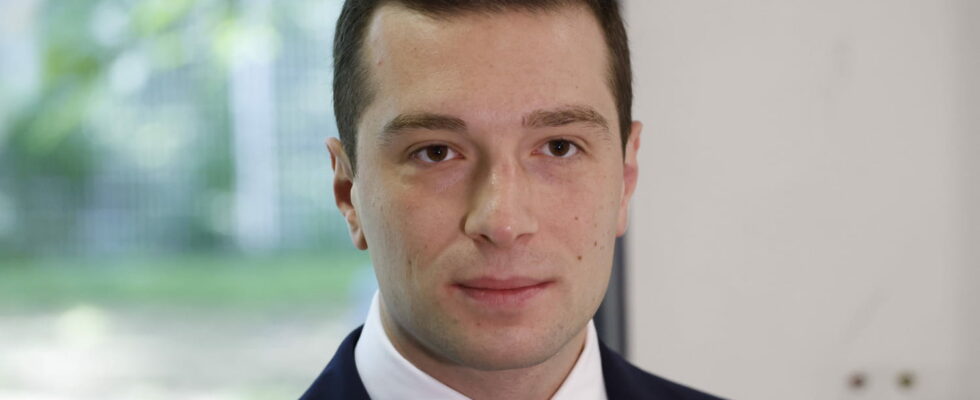Will Jordan Bardella become Prime Minister after the early legislative elections? The first round put the RN in a strong position, but it is the second round that will be decisive for the party leader.
Jordan Bardella will be paying close attention to the results of this Sunday’s vote. His goal: to obtain an absolute majority in the National Assembly, or at least 289 deputies. The RN placed itself in a strong position after the first round with 33.15% of the vote. They were followed by the New Popular Front (28.14%) and the presidential majority (20.76%). For the second round, the RN qualified in 485 constituencies out of 577, including 258 where it came out on top. 39 of its deputies were even directly elected in the first round. In 141 constituencies, the RN candidate has a good lead with more than 40% of the votes cast in the first round.
The stakes are high for the RN president, who wants to be appointed Prime Minister in the event of an absolute majority. “If the voters grant us an absolute majority to straighten out the country, I intend to be the Prime Minister of all French people, listening to each and every person, respectful of opposition, open to dialogue and concerned at every moment with the unity of the nation. I intend to be the Prime Minister of everyday life, the one who will place among his top priorities the defense of purchasing power, the restoration of order and security throughout the territory and of course the resumption of control of our migration policy,” he declared in his speech on Sunday, June 30.
The RN president also spoke about his vision of a potential cohabitation with Emmanuel Macron: “I intend to be a Prime Minister of cohabitation, respectful of the Constitution and the function of the President of the Republic, but uncompromising on the policy that we will implement in the service of France”, assured Jordan Bardella after the first results.
Jordan Bardella also called for votes for the second round in which “two paths are open to France”. According to him, it is either “the alliance of the worst, that of the NFP gathered behind Jean-Luc Mélenchon which would lead the country to disorder, insurrection and the ruin of our economy” and on the other “national unity (…) This unprecedented alliance motivated by the national interest is now the only republican and patriotic bulwark that can make France win, protect our institutions, restore security, decree fiscal peace and defend work”. The second round this Sunday, July 7 will be “one of the most decisive in the entire history of the Fifth Republic”, according to Jordan Bardella. If the RN is missing a few deputies, the one who aspires to become head of government has a plan that he specified on BFMTV July 3: “Obviously, if we are short of three or four seats, we can imagine that there will be around us various right-wingers, Republicans who agree to work with us and work on the budget.”
What result for Jordan Bardella and his party in the second round of the legislative elections?
One of the major parameters of this second round will be the transfer of votes from voters who saw their candidates eliminated or withdraw. The turnout is also one of the keys to the outcome of this election. If it rose to 66.71% in the first round, will voters who are not satisfied with the choice they were left with necessarily go and vote again? According to the projections of the polls published before the reserve period of Friday, July 5 at midnight, such as the projection below, the RN is given a large lead in number of seats but not with an absolute majority. According to work carried out by The Great Continentdated July 2, specifying the projections taking into account the various withdrawals for the second round, the RN would obtain between 225 and 262 seats, less than the 289 needed to have an absolute majority. However, it would largely exceed the NFP with between 137 and 157 and Ensemble with between 107 and 133 seats. However, the reliability of such an estimate is necessarily less strong than a poll of voting intentions. The methodology used is different, constructed from the Cluster 17 poll matrices and the probable vote reports in each constituency. It reflects trends at a specific time.
In this scenario, it is impossible for the RN to govern the country. The government being responsible to Parliament, it must indeed correspond to the majority elected in the ballot boxes during the legislative elections and even more so hold in the event of a motion of censure. If a majority of deputies agree, they can indeed bring down any government, which will certainly be the case if it is from the RN without having an absolute majority. In this scenario, Emmanuel Macron and his party will seek a “technical” coalition to allow for broad governance for three years, with elected representatives from the left, center and right.
